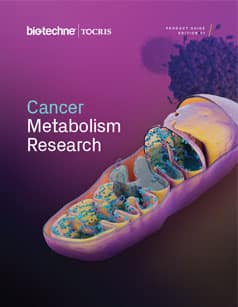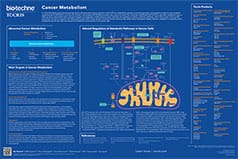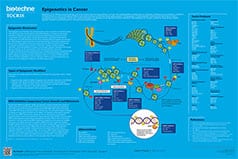MTH1
MTH1 (MutT homolog-1; NUDT1) EC 3.6.1.56 is an oxidized purine nucleoside triphosphatase, which is part of the Nudix hydrolase family. MTH1 hydrolyzes cytotoxic oxidized dNTPs, preventing them from becoming mis-incorporated into DNA during replication or repair.
MTH1 Inhibitors |
|
|---|---|
| Cat. No. | 产品名称/活性 |
| 6562 | BAY 707 |
| Potent and selective MTH1 inhibitor | |
| 6025 | (S)-Crizotinib |
| MTH1 inhibitor | |
MTH1 (MutT homolog-1; NUDT1), EC 3.6.1.56, is an oxidized purine nucleoside triphosphatase, which is part of the Nudix hydrolase family. MTH1 hydrolyzes cytotoxic oxidized nucleoside triphosphates (dNTPs), such as 2-OH-dATP, preventing them from becoming mis-incorporated into DNA during replication or repair, thus promoting cell survival.
Redox dysfunction is common in cancer cells, owing to their altered metabolism. This results in an excess of reactive oxygen species (ROS), which damage free dNTPs. By preventing the oxidized dNTPs from corrupting the cell's DNA, MTH1 promotes tumorigenesis, cancer progression and apoptosis evasion. Cancer cells, unlike normal cells, are proposed to depend on MTH1 activity for survival, making it an attractive therapeutic target because it is cancer phenotypically lethal. Furthermore free dNTPs are significantly more susceptible than DNA to this type of oxidative damage, so targeting dNTPs may be an efficient method of encouraging replicative stress, reducing proliferation and inducing apoptosis in cancer cells.
In addition to its role in the evasion of DNA damage, MTH1 also plays a role in maintaining many KRAS-driven malignant traits in nonsmall cell lung carcinoma (NSCLC). In support of this, there is a strong association between MTH1 and KRAS expression levels, with suppression of MTH1 resulting in decreased KRAS levels, and a reduction in KRAS-driven malignancy, although these outcomes are influenced by the cells' p53 status.
External sources of pharmacological information for MTH1 :
Literature for MTH1
Tocris offers the following scientific literature for MTH1 to showcase our products. We invite you to request* your copy today!
*Please note that Tocris will only send literature to established scientific business / institute addresses.
Cancer Metabolism Research Product Guide
This product guide reviews some of the main areas in cancer metabolism research and lists around 150 products that can be used to investigate metabolic pathways in cancer including:
- Glycolysis
- Tricarboxylic Acid Cycle
- Lipidogenesis
- 1C Metabolism and Nucleic Acid Synthesis
- Drivers of Metabolic Reprogramming
- pH and Redox Balance
Cancer Metabolism Poster
This poster summarizes the main metabolic pathways in cancer cells and highlights potential targets for cancer therapeutics. Genetic changes and epigenetic modifications in cancer cells alter the regulation of cellular metabolic pathways providing potential cancer therapeutic targets.
Epigenetics in Cancer Poster
This poster summarizes the main epigenetic targets in cancer. The dysregulation of epigenetic modifications has been shown to result in oncogenesis and cancer progression. Unlike genetic mutations, epigenetic alterations are considered to be reversible and thus make promising therapeutic targets.


